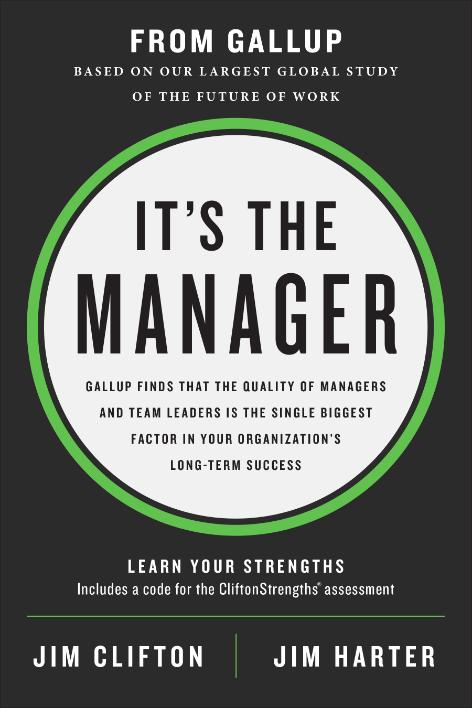Story Highlights
- Coaching is the biggest deficit in traditional performance management
- Effective conversations inspire, motivate and engage employees
- Lead progress reviews that focus on achievements, fairness and goals
COVID-19 is depressing, scary and surrounded with uncertainty. But what is certain is that with midyear progress reviews just around the corner -- and right amid an unprecedented global business disruption -- your organization's managers need to be more prepared than ever to inspire, motivate and engage your employees. And they can do it with one of the oldest tactics in management: conversation.
Right now, some managers aren't sure how to have a motivating conversation. But that's not a new problem -- Gallup finds that only 21% of employees strongly agree they are managed in a way that motivates outstanding performance.
The most effective conversations require a manager who understands the power and edge in the employee's talents. When a manager learns to listen -- really listen -- to what the employee shares, they'll begin to hear clues to the employee's talents. Those clues are the key to inspiring and motivating individual performance.
Sounds simple enough. But managers who are coaches -- not bosses -- are relatively rare. Gallup has discovered that 19% of employees strongly agree that their manager recently reviewed their greatest successes -- these employees are 3.8 times more likely to be engaged. And companies need engaged employees right now. If ever there were a time to learn how to coach, a performance review during a pandemic is it.
Three Elements of a Successful Progress Review
Progress reviews are not just about communicating metrics and correcting problems. They're also about having engaging developmental conversations grounded in a well-rounded view of the performance expectations that matter most.
If ever there were a time to learn how to coach, a performance review during a pandemic is it.
The difference between an effective progress review and an ineffective one is how it's conducted. Ineffective reviews focus on the past. They cover only the most recent performance and feel unfair or biased to employees. The worst reviews are laden with surprises and personal criticisms of the employee's weaknesses. Unfortunately, that's the norm: Only 14% of workers strongly agree that their performance reviews inspire them to improve.
Managers who engage in effective conversations celebrate the employee's achievements and give developmental feedback -- in a way that is constructive and engaging for both people. Effective conversations are achievement-oriented, fair and accurate. And they hold employees accountable only for things they can control -- but only two in 10 employees strongly agree theirs do.
Coaching through performance development is a radically different approach to progress reviews. For your managers to coach -- not boss -- in their next progress review, ask them to use this three-part blueprint to keep employee performance reviews:
1. Achievement-oriented.
Begin with celebrating the employee's successes and how they achieved them. That inspires well-deserved pride and encourages self-reflection on achievements -- and how the employee can replicate them. Successes often coincide with challenging and intrinsically motivating work. Be sure to discuss that, too. And when you start by celebrating the employee's achievements, discussing their interests, motivations, and how they relied on their strengths and partnerships is a natural (and productive) next step.
2. Fair and accurate.
Employees must trust that the assessment of their performance is accurate to see a progress review as an effective performance improvement tool. Employees tend to believe that once-a-year evaluations are inaccurate and unfair because they often cover little relevant performance information and are easily influenced by manager bias -- therefore creating pay incentives based on insufficient data. Managers and leaders must use fair, accurate data so employees can truly make sense of their experiences. Anything else is liable to disengage and demotivate employees.
3. Developmental.
Effective reviews help employees sustainably grow and improve, so the conversation must include the employee's progress toward their developmental goals.
For the goals to be meaningful to both parties, the manager and employee should set them together and discuss them often. That can boost the employee's engagement and accelerate their personal and professional success. But only 20% of employees strongly agree that they have talked with their manager in the past six months about steps to reach their goals. It's a pity -- development-focused reviews not only make employees better in their roles, but they also remind employees and managers how much people can grow and succeed, even during the toughest times.
Progress in the COVID-19 Era
Great managers have always been invaluable. But COVID-19 reinforces business' urgent need for managers to evolve from a boss to a coach.
But coaching is the biggest deficit in traditional performance management. Most managers don't have an open, ongoing dialogue about performance with their employees. Discussing weaknesses with employees once or twice a year isn't coaching, and it doesn't help.
Employees need help. Managers need help. Companies in the COVID-19 era need a lot of help. Managers must learn to equip, inspire and enable employees with ongoing coaching conversations. They can inspire the performance your business needs now by doing progress reviews right -- one conversation at a time.
Gallup is here to help you help your people:
- Get more advice on re-engineering your performance management process.
- Learn more about the four needs of followers with the free webinar "What Employees Need From Leaders During a Crisis."
- Develop your managers and teams with a virtual performance management course.





